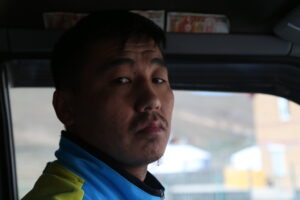Who by fire?
Who by water?
Who in the sunshine?
Who in the nighttime?
And who, shall I say, is calling?
–Leonard Cohen

Shoulder to shoulder with trucks and cars and motorcycles of every size and shape in the haze of polluted post Soviet decaying landscape, our driver, Bayaraa, possessed by the ghosts of his horsemen ancestors, pushes his van into the herd of vehicles and races neck and neck, feigning, falling behind, surging ahead.
Ulaanbaatar falls from view; grasslands appear from beneath trash rubble heaps; ger–the round tents of nomad herders–goats, sheep, camels, horses graze alongside motorcycles.
As Bayaraa drives he hangs his head out the window every now and then, rests it on the door frame and watches the road go by beneath him. Steering this way, he appears to nap while keeping the van on the road; he is definitely not looking ahead. I imagine his mother telling him to watch the road. I imagine him laughing.
My fingers find the worn mala at my neck and pass over the beads; om ah hung benza. Vermont is a far off land, farther perhaps than Dewachen.
We careen sideways into a dusty parking lot, dusty dogs with soft eyes hanging around in the dirt, sleeping, scratching…kids run around laughing, grow shy at the sight of us. Bayaraa leaves the engine running, disappears, reemerges from one store with a bundle, from another with a bag.
Further down the highway an hour or so: raw landscape. No ger camps, no cement block shops, only mile after mile of red-stripe on white road markers, everyone dozing snaps to when Bayaraa slows the van to a crawl and u-turns, heads back from where we came, u-turns again and comes to a stop on the shoulder. With a quick word to our translator Degi, he jumps down from the van, gathers bundle and bag and walks away.
Degi whispers quietly in her melodic Mongolian flavored English that Bayaraa’s brother died here by the side of the road. Here, in the middle of nowhere. We don’t ask how. I hear my teacher’s voice remind me, “Sometimes, one must meditate without reference points.”
One road marker the same as the next; we are awash in impermanence.
Bayaraa slips and slides in worn city shoes down scree riddled steep cut bank to his brother’s shrine, a rock cairn pyramid splattered speckled and glazed with offerings of milk, vodka, candy, biscuits, bits of cloth. We follow.
Our driver kneels unashamed in the midst of strangers, unpacks his offerings with reverence, prepares an altar: 2 cheap plastic cups–one milk, one vodka–cookies (biscuits), candy. Face to the sky he opens hands, prays; forehead pressed to gravel, he weeps openly. The rest of us weep without tears. Westerners cursed by correctness, steeped in avoidance, separated from the beauty of sorrow.
A lone car passes; heads turn not in curiosity but acknowledgement–in this land where ancient customs mingle freely with the industrialized world, ours is not an odd scene.
This is not America. This is definitely not America.
Our accidental temple floor is made of rock mingled with frayed pieces of exploded tire, crushed and scattered vodka bottles, cracked plastic cups, milk cartons, grocery bags, scrub brush. Somehow, this is not a polluted landscape.
We climb back up the cut bank in silence to the van, sacred music of wind and crunching scree. Each of us in turn offers our driver an embrace. I press my face to his jacket and he cries again, tears drop and join the spots of milk that dot the black leather, mingle with my own. Perhaps we are all one after all.
He is Bayaraa; he is holy. This is Mongolia.